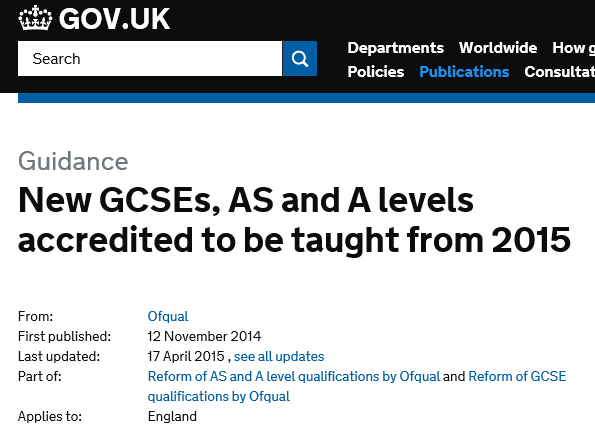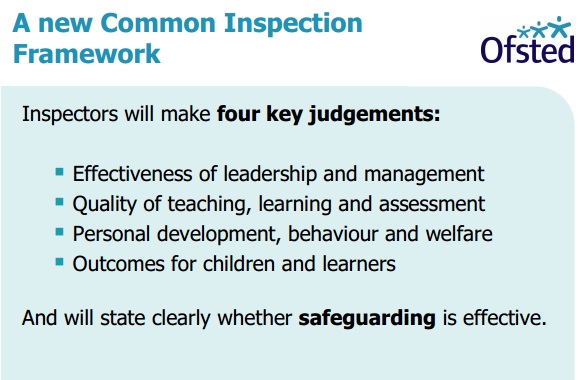Monday and today (Tuesday), I am at Warwick University with Ofqual. I am here for their accreditation workshop to enable me to fulfil my role as Lead Reviewer for GCSE PE, having been initially contracted with Ofqual as their Subject Expert. I am part of the GCSE PE team, consisting of three further PE reviewers, a Case Officer and a Chair. We are just one of many teams working as part of tranche 3 (some 31 subjects, 20 GCSE and 11 A/AS Level).
The case for a strong accreditation process
Day 1 was a fascinating insight into the complex and comprehensive accreditation process, from Ofqual’s over arching General Conditions of Recognition* to which all awarding organisations must comply, whatever the qualification type. Through to the Qualification Level Conditions and Requirements, in my case GCSE. Finally, the Subject Level Conditions and Requirements that sets out the detail of what is required for each individual GCSE, AS and A Level, in my case PE. These are the specific requirements of the subject qualification; content, assessment objectives, the balance of written and non-examined assessment and any particular ways the content must be interpreted and assessments designed.
Assessment strategies are a new requirement for awarding organisations. Each assessment must set out how the awarding organisations intends to secure, on an ongoing basis, compliance with Ofqual’s Conditions of Recognition in respect of assessment. It sets out and explains the approach the awarding organisation has taken, and will take, in meeting all the regulatory requirements for the subject and qualification. The division of subject content and balance of assessment objectives, weighting of components, the rationale for additional content, down to how questions/tasks and marks schemes are appropriate for the subject, managed of time, how these mitigate predictability, how assessments will be delivered, marked, moderated.
The accreditation process then, driven by the DfE, aims to ensure valid, reliable and manageable qualifications. It sounds straight forward, in truth, it is a significant, comprehensive commitment to setting and maintaining standards.
In reflection, Day 1 really broadened my perspective on assessment. At a recent leadership interview I was asked, what makes for an effective assessment strategy? I am confident that school leaders will have a concrete opinion/answer to that questions. Something along the lines of;
- Systematic checking of pupils’ understanding that has a notable impact on learning, directs learning and anticipates support.
- Quality feedback is used in class to encourage and secure progress (progress/learning debate set aside) in lesson and long-term (in class / books) to ensure sustained progress over time.
- Questioning is differentiated, probes and secures learning with multiple strategies employed effectively and specifically for sub groups.
- Pupils are able to accurately assess their own work, accurately assess and feedback on the work or their peers. Success criteria are available.
- Marking that is frequent and accurate. Pupil response or action is evident.
- Assessment and progress is tracked, monitored and underachievement addressed, success celebrated.
- Assessments are moderated, standardised valid and reliable. Marking is moderated and standardised.
Ofqual’s accreditation process then, is a significant layer of formal, regulatory preparation that frames the Teaching, Learning and Assessment of all teachers, in schools and colleges throughout the land. A process designed to be robust, consistent, repeatable. A process to maintain confidentiality, with clear roles and responsibilities. Designed to be measured and reviewed, and lastly defendable (that due process has been followed).
My parting reflection from the two days training a) I was very fortunate to be leading an experienced and collegiate review panel and case officer and b) if the accreditation process was shared / outlined to the teaching profession, I would hope that school leaders, subject leaders and teachers would be at least reassured, if not impressed by the comprehensive quality assurance processes under-writing the new GCSE and AS / A Levels qualifications. I do have one line of enquiry left to explore. How effectively will the aforementioned “assessment strategy” tackle the targeted criticism of the quality of exam marking.
General Conditions of Recognition* sets out the requirements for:
- How awarding organisations is governed, how it interacts with us [Ofqual] and how it manages its relationships with third parties.
- How qualifications should be designed, delivered and awarded in a way that is fit for purpose and meets the needs of users.


